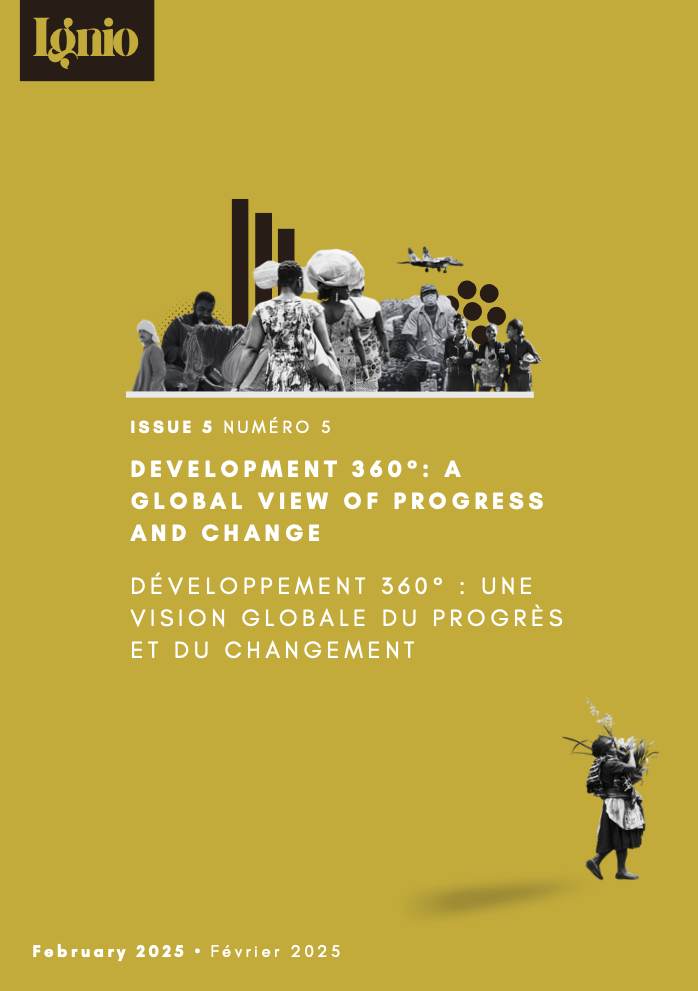Ignio is a student-driven initiative created to build a space for students, recent graduates, and all those interested in contemporary international development issues to learn through the community, share ideas through non-traditional methods, and facilitate connections within the international development studies community.
For more information on submitting your work for publication with Ignio, please visit our page on submissions here.
-
Issue 5, Volume 1: Development 360°: A Global View of Progress and Change
Introduction
-
Student Steering Committee
Development 360°: A Global View of Progress and Change
Published Voices
-
Sasha A. Imbleau, Sasha Adeline Imbleau (she/her) is a fourth-year International
Development and Globalization student at the University of
Ottawa. With a particular interest in migration, international
political economies, and international law. These interests are
reflective and in line with her path, having never resided in any
single city for more than three years, including her current home
in Ottawa. Her piece was originally written as a final research
project for a course that was taken during her year abroad at the
University of Manchester.
-
Laila Ibrahim, Laila Ibrahim (she/her) is a second-year student in the
integrated Political Science and Juris Doctor program at the
University of Ottawa. Her research interests include economic
development challenges in the Middle East and North Africa, the
complexities of the Arab Spring, and post-colonial identity. She is
also a political staffer on Parliament Hill where she aims to help
make a difference in her community and political party. In her
(limited) spare time, Laila loves to travel, experience new
cultures, and engage with her Egyptian heritage.
-
Harini Gnanalingam, Harini Gnanalingam (she/her) is a second-year International
Development and Globalization student at the University of
Ottawa. Passionate about global issues and policymaking, she is
dedicated to creating positive change both locally and
internationally. Harini actively volunteers with community
organizations across Canada. She is particularly focused on
working with the Tamil diaspora, helping to promote and
preserve its cultural heritage. Through her studies and
community involvement, Harini aims to bridge the gap between
global development policies and the needs of local
communities, with a strong commitment to social justice and
cultural advocacy.
-
Yohanan Demeke, Yohanan Demeke (she/her) holds a bachelor’s in International
Development and Globalization from the University of Ottawa.
Currently, she is a Youth Program Manager at the Somali Centre
for Family Services. A dedicated community volunteer, she
champions youth empowerment, gender equality, and climate
justice.
Blog Posts
-
John Banks, John Banks (he/him) is a recent graduate from the University of
Guelph’s Political Science (Hons.) programme, minoring in
International Development. He has an interest in right-wing
authoritarian movements and foreign interference issues,
especially transnational repression. He is even more excited
about matters in which these subjects overlap. John has
previously contributed to documentation projects identifying
neo-Nazis and exposing their activities.
-
Nangoh Sarrah Traore, Nangoh Sarrah Traoré (she/her) is a fourth-year international
student from Burkina Faso studying International Development
and Globalization at the University of Ottawa. While her journey
began on a different path in biomedical sciences, international
development has always been her passion. She has spent
countless hours researching to understand the systemic
challenges that perpetuate inequality, particularly regarding
environmental and humanitarian crises. She currently serves as
a fundraising assistant with the Refugee Support Association
contributing to a grassroots efforts to mobilize resources to
support a vulnerable populations. It is her belief that nothing is
set in stone and that with enough knowledge, a person can
contribute to transformative change that promotes
sustainability, resilience and equity on a global scale.
-
Samantha Dawe, Samantha Dawe (she/her) is a fourth-year International
Development and Globalization student at the University of
Ottawa. Her favourite areas of development research include
human rights and gender equality, and she loves to explore these
issues within various legal frameworks. In her spare time, Sam
enjoys reading, watching movies, and visiting her nieces and
nephew.
Creative Connexion
The images included in this publication may not be downloaded, reproduced or used without the artist’s permission.

